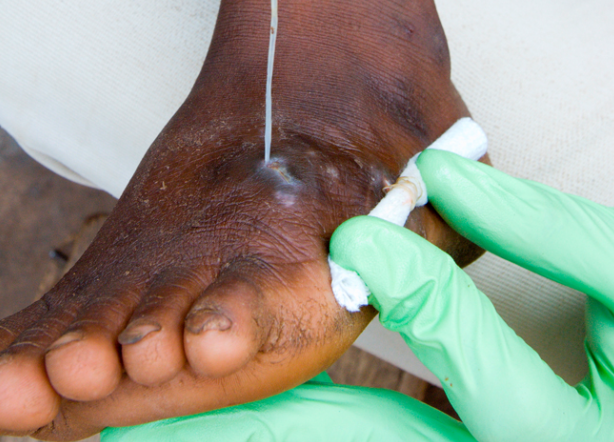Guinea Worm Disease Nears Eradication
Guinea worm disease is a crippling and painful infection caused by long thread-like Guinea worms that emerge slowly from human skin blisters after incubating for about a year since the carrier has ingested parasite eggs in contaminated water. Sufferers find it hard to function for months.
Guinea Worm Disease (Dracunculiasis) which has been affecting the most disadvantaged communities is on the verge of eradication. It is set to become only the second human infection to be eradicated globally after smallpox through persistent low-cost public health efforts led by the Carter Center spanning four decades.
Significance of Achievement
In mid-1980s, there were over 3.5 million Guinea worm cases annually across 20-odd nations mostly in parts of South Asia and Sub-Saharan Africa. After dedicated eradication efforts, cases dropped dramatically to 14 in 2021, 13 in 2022 and were down to 6 in 2023 restricted now in parts of just 4 African countries. This underscores power of grassroots interventions catalyzed by global partnerships in tackling neglected diseases where commercial incentives remain lacking.
No Medical Breakthroughs Like Vaccines
Unlike infections like smallpox and polio that were defeated using special vaccines, no drugs, medicines or immunization discoveries have emerged to prevent or cure Guinea worm disease effectively over the decades of fighting this affliction. The resilient Guinea worm parasite. It hijacks human bodies in brutally painful manner and possesses astonishing survival abilities inside water fleas.
Reliance on Low Cost Public Health Steps
Preventive approaches like using cloth filters for drinking water, larvicide application in ponds, bandaging emerging worms from blisters to prevent contamination along with village-level surveillance, education and cash rewards for reporting cases quietly achieved the unprecedented drop without medical breakthroughs.
Remaining Hotspots
Present only in remote parts of just four sub-Saharan African countries namely South Sudan, Ethiopia, Chad and Mali where political instability and civil unrest persists, complete wiping out of the tenacious Guinea worm infection difficult. But the overall reductions indicate comprehensive eradication remains probable in coming years using the same disciplined community-based interventions.
Proof of Concept for Global Health Equity
The hard fought battle against Guinea worm stands out as unique success for health equality by focusing on needs of marginalized rural poor using affordable solutions delivering outsized gains, beyond deployment of advanced but costly mainstream interventions like vaccines and antibiotics.
Category: Science & Technology Current Affairs








